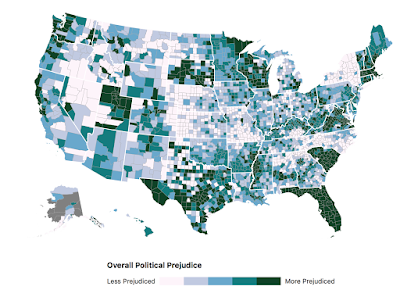A recent article in The Atlantic features a set of maps showing where in the United States people show more or less prejudice towards people from other political parties.
The map is based on a survey with questions like how would you feel about a close family member marrying a Democrat or Republican. Darker areas are places where prejudicial feelings are higher. "In general, the most politically intolerant Americans, according to the analysis, tend to be whiter, more highly educated, older, more urban, and more partisan themselves." These people tend to be more politically isolated-less likely to talk to people who disagree with them and more likely to assume the other side is more extreme than they are.
Hover over a county to get percentile information.
What is really interesting is the state to state variability. Compare the Carolinas to each other-or the Dakotas. Some of this may be due to specific statewide factors such as a recent controversial statewide election. There are also maps for each political party's level of prejudice.
The chief takeaway seems to be that people living in certain areas, such as small towns, associate more with other who have different opinions and are better able to see their humanity, if not better understand their point of view. I work with lots of people who have very different opinions than me and sometimes we talk about politics but rarely because they're dumb, awful people who hate America - #justkidding.
The map is based on a survey with questions like how would you feel about a close family member marrying a Democrat or Republican. Darker areas are places where prejudicial feelings are higher. "In general, the most politically intolerant Americans, according to the analysis, tend to be whiter, more highly educated, older, more urban, and more partisan themselves." These people tend to be more politically isolated-less likely to talk to people who disagree with them and more likely to assume the other side is more extreme than they are.
Hover over a county to get percentile information.
What is really interesting is the state to state variability. Compare the Carolinas to each other-or the Dakotas. Some of this may be due to specific statewide factors such as a recent controversial statewide election. There are also maps for each political party's level of prejudice.
The chief takeaway seems to be that people living in certain areas, such as small towns, associate more with other who have different opinions and are better able to see their humanity, if not better understand their point of view. I work with lots of people who have very different opinions than me and sometimes we talk about politics but rarely because they're dumb, awful people who hate America - #justkidding.




1 comment:
Interesting that you point out Platte County. Having worked in that government, I can validate that data. Folks of that county have a tendency of blindly pulling the Red lever, and are very proud of that. It is kind of sad, really.
Post a Comment